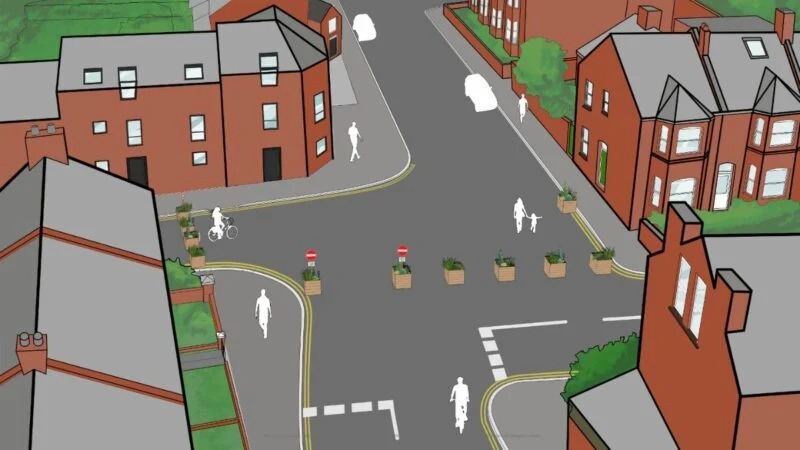“Supporters of the Low Traffic Neighbourhood say it makes for cleaner residential streets, but protesters say it is just sending the traffic elsewhere, causing congestion and pollution”
.
AIR POLLUTION AND CONGESTION:
How are we going to decarbonise Exeter’s streets? is a question which is becoming more urgent to address – as we learnt this week that Wednesday is Exeter’s most-congested day:
Traffic in the city has returned to 98 per cent of pre-pandemic levels, bouncing back from its lockdown-induced plunge, according to Devon County Council data.
Jamie Hulland, deputy director in the environment, climate change and transport directorate at the county council, told business leaders at an Exeter Chamber of Commerce travel seminar that Exeter has the nation’s second-largest travel-to-work population, which puts severe pressure on its constrained road network.
“We need to think about how to reduce the reliance on cars, encourage the use of other modes of transport and improve health outcomes for people.”
Ways forward are to encourage more cycling and walking; or to bring in cameras rather than bollards to control the traffic – but the citizens and commuters of the city need to be brought into the various schemes, as shown with more protests over the Heavitree Low Traffic Neighbourhood happening mid week:
Roads have been blocked since August in a Low Traffic Neighbourhood (LTN) trial designed to cut down on pollution and make the streets safer for pedestrians. Supporters say it makes for cleaner residential streets, but protesters say it is just sending the traffic elsewhere, causing congestion and pollution and making journeys around the city longer. A group waving ‘Stop The Block’ placards greeted members arriving for full council, and their chants and whistles could be heard inside as the meeting began.
Following on from this meeting, taxis will be allowed through the roadblocks from next month:

Devon County Council says it has listened to people’s concerns and will allow Hackney carriages and private hire vehicles to use the bus gates from Thursday, 9 November. The gates were introduced to allow access for buses and emergency services. A County Hall spokesman said that from the outset the Active Streets pilot had been ‘experimental’, and would be closely monitored before any decision was taken on making it permanent.
And taxi-drivers have welcomed the concession:
Taxis will be allowed to bypass traffic bollards installed as part of a controversial road closure scheme in Devon. Jonathan Kellaway, from the Exeter Hackney Carriage Forum, said taxi drivers welcomed the decision. “This will help mitigate the negative impact of the LTN on vulnerable children and adults who rely on our services,” he said. “We look forward to continued dialogue with the highways authority on this and other related issues affecting our trade.”
CONSULTATION AND DEBATE:
It’s clear that the Heavitree and Whipton Active Streets scheme trial will need time and tweaking – with the consultation running online – although the change to the scheme allowing taxis through will mean that that the council will now have to restart a new six-month statutory consultation period.
Finally, what is perhaps needed is some informed, conciliatory debate – as proposed by the Exeter Civic Society:
Our Committee has provided funds to run a round table event, possibly in November. We want to bring the different factions in the debate about the ‘Heavitree & Whipton Active Streets Trial’ together. After a meeting of the ‘Strategic Planning & Highways Group’ in August, we realised that ECS is in a good position to act as a mediating convenor. At the meeting organised by DCC in St. Mark’s Church, Pinhoe Road, on 14 Sep it became clear that a different format would be beneficial to allow for an informed debate and come up with some constructive suggestions. We have some interest already from different groups to be present at a potential round table.
The Trial, which started in August, is planned for 18 months; the current DCC consultation runs for 6 months till 2 Feb 2024, which will provide us with ample time to achieve something after a November Round Table. DCC informs, that the consultation will be carried out through an online consultation form on our dedicated webpage, devon.cc/exeterstreets.
…